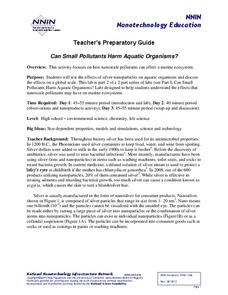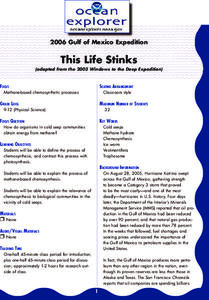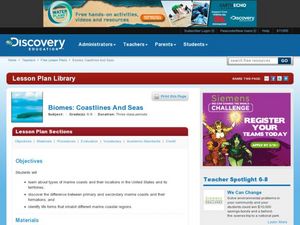University of Georgia
Flavor of Organic Chemistry
Introduce organic chemistry through an analysis of flavor. A three-part unit begins with an overview of the components of flavor. Next, scholars prepare esters through esterification. Finally, they examine how all senses have an impact...
Curated OER
Chemistry: Real Life Chemistry (for the Business World)
In this real life chemistry worksheet, high schoolers are given 4 conversion factors and they solve 7 problems using the given conversion factors. They find the number of "widgets" and "watzits" needed to complete a "system". They find...
Curated OER
Real Life Chemistry (for the Business World)
In this real life chemistry instructional activity, high schoolers are given 12 problems to solve by converting from one unit to another. Students are given conversion factors to find their answers including finding the number of moles...
Curated OER
X-ray Spectroscopy and the Chemistry of Supernova Remnants
This link takes you to a comprehensive unit that delves into emission spectra and supernovas. There are four parts: How and where elements are created, electromagnetic radiation, spectroscopy, and the newest technology for studying our...
Northwest High School Science
Metric Conversion: Stair-Step Method
Elevate young scientists' skills with unit conversion using the stair-step method. Detailed instructions and a neat stair-step diagram are on the first page. Four pages of practice problems follow, mostly with real-world applications....
Kenan Fellows
Unit 3: Genetic Variation
What happens when genes change? Junior genetic investigators examine the effects of mutation in the third unit of a four-part Biotechnology series. Individuals discover the types of mutations through a series of PowerPoints, then partner...
Curated OER
Chemistry of Carbon
After giving basic details about the properties of carbon, some of the common functional groups and molecules are featured. There is some information about specific functions and impact on the human body. The diagrams are helpful and...
Curated OER
Urban Life: What Lives In Our Local Park?
Fifth graders participate in activities during a visit to Central Park. In this urban life lesson, 5th graders visit Central Park where they explore pond dipping, stream chemistry, and play a native plant Bingo game.
Curated OER
An Introduction to Chemistry
In this introduction to chemistry worksheet, students complete 48 problem solving and fill in the blank questions. They convert measurements from one unit to another.
Curated OER
Unit Conversions
In this unit conversions worksheet, students calculate and convert measurements from one unit to another. They complete 109 short answer and problem solving questions involving unit conversions.
National Nanotechnology Infrastructure Network
Can Small Pollutants Harm Aquatic Organisms?
Nanoparticles have toxic effects on plant and animal life—even though you can't see them. The second lesson of a two-part series has young scientists conduct an experiment that exposes plant and animals to nanoparticle pollutants. They...
Curated OER
Dietary Supplements and the Chemistry of Life
Students study the effects of dietary supplements on bodily functions. In this health lesson students calculate their caloric needs and research dietary supplements.
Curated OER
Half-life Worksheet
In this half-life worksheet, students determine how long it takes for a 100g sample of AU-198 to decay to 6.25g. Then they determine the half-life of a radioactive isotope if a 500.0g sample decays to 62.5g in 24.3 hours. Students also...
Curated OER
Percentages in Chemistry
In this algebra worksheet, students solve for percentages using chemical reactions as a real life scenario. The convert to grams when determining percentage of mass. There are lots of examples on how to convert for different units.
Curated OER
The Chemistry of Life
Students study atoms and chemical compounds. They identify certain elements essential to human health, describe physical and chemical properties of water, and name four types of polymers unique to all life forms. They explain how each...
Curated OER
This Life Stinks
Chemosynthetic communities of cold seep areas are considered in this lesson. Working in collaborative groups, marine biology or oceanography learners research and prepare a report about oxidation-reduction reactions involved with...
Baylor College
Crossing the Synaptic Gap
As part of a unit on the chemistry of the brain, thinkers learn how chemicals work to transmit messages between individual neurons and how controlled substances impact the synaptic cleft. They do so by playing a dice-and-card game in...
Baylor College
Neural Network Signals
Using a simple circuit with the battery representing the brain, future physiologists test to see which solutions conduct electrical "nerve impulses." Enlighten learners with plentiful information on electric signals in the nervous system...
NOAA
I Can't Breathe!
The Gulf of Mexico dead zone, an area of low oxygen that kills marine life, costs the United States $82 million every year. Young scientists research anoxic ocean environments then come up with a hypothesis for the cause of the Gulf of...
Consortium for Ocean Science Exploration and Engagement (COSEE)
Ocean Acidification: Whats and Hows
Open this activity by demonstrating the production of acidic carbon dioxide gas by activated yeast. Emerging ecologists then experiment with seashells to discover the effect of ocean acidification on shelled marine organisms. They...
Curated OER
Biomes: Coastlines and Seas
Students study the different types of coastlines and their territories. In this marine coasts lesson students identify life forms that are in the coastal regions.
Teach Engineering
The Great Pacific Garbage Patch
The Great Pacific Garbage Patch is one of several garbage patches around the world where garbage accumulates naturally. As part of a GIS unit that combines oceanography, environmental science, and life science, class members investigate...
Curated OER
Chemistry of Carbon: Building Blocks of Life
After giving basic details about the properties of Carbon, some of the common functional groups and molecules are featured. There are some details about specific functions and impact on the human body. The diagrams are helpful and could...
Baylor College
Food for the Brain
With a couple of neat diagrams on student handouts, your life science or health class will examine the contents and serving sizes of healthy foods. They dissect a slice of pizza and scrutinize the nutritional value of its components in...

























